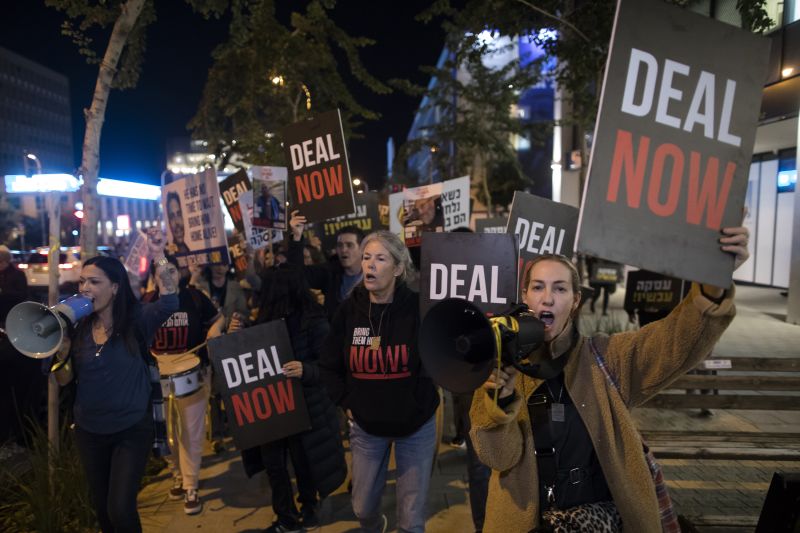
The Ongoing Conflict in Gaza: A Search for Resolution

The conflict in Gaza continues, with no end in sight. However, recent indirect talks between Israel and Hamas have sparked hope for a possible agreement. Let's explore the current situation and the potential for a resolution in the ongoing crisis.
The Stalemate
The Gaza war has persisted for nearly five months, resulting in a devastating toll of over 25,000 Palestinian casualties, both civilian and combatant. Despite the prolonged conflict, Israel's objective of dismantling Hamas remains unfulfilled. The absence of a viable proposal acceptable to both parties has perpetuated the deadlock, leaving little hope for an immediate ceasefire, let alone a permanent resolution.
TEL AVIV, ISRAEL - JANUARY 18: Protesters hold signs and photos of hostages as they are marching during a protest calling for a hostage deal on January 18, 2024 in Tel Aviv, Israel. More than 100 Israeli hostages, who were taken captive by Palestinian militants during the Oct. 7 attacks, remain in captivity in Gaza, according to Israeli authorities. Earlier this week, a deal was struck to allow medicine to be brought to the hostages, in exchange for Israel allowing more humanitarian aid to be permitted into Gaza. (Photo by Amir Levy/Getty Images)
While suggestions have emerged from both sides, they have yet to materialize into concrete solutions. The involvement of Qatar as a mediator has led to 'serious discussions' between Israel and Hamas, indicating a willingness to engage in dialogue. Indirect talks are underway, hinting at the possibility of entering a 'Zone of Possible Agreement' (Zopa), as described by Ofer Shelah, a Senior Researcher at Israel's Institute for National Security Studies (INSS).
Proposed Solutions
Recent proposals have surfaced, offering potential pathways to a temporary truce. Israel's suggestion of a two-month ceasefire, coupled with the release of hostages held in Gaza, presents a glimmer of hope. Concurrently, discussions involving the exile of Hamas leaders as part of a broader ceasefire have been put forward. On the other hand, Hamas has signaled its willingness to release some hostages in exchange for a pause in the fighting. These developments indicate a willingness from both sides to explore potential avenues for a ceasefire and hostage release.
However, a significant hurdle arises as Hamas seeks a comprehensive 'package deal,' encompassing a second-phase agreement to end the war. The complexity of such an arrangement poses a challenge, as doubts linger over the sincerity of both parties in reaching a lasting resolution. The reluctance to commit to a deal, whether for genuine reasons or domestic posturing, adds further complexity to the negotiation process.
Challenges and Dilemmas
The prospect of exile for Hamas leaders has been contemplated, yet it faces resistance and skepticism. The Qatari Prime Minister's dismissal of the exile proposal reflects the entrenched resistance to this option. Hamas leaders' preference to remain in Gaza, despite the risks, underscores the significance of their presence in the region. Meanwhile, Israel's reluctance to endorse the exile of Hamas leaders further complicates the negotiation landscape, indicating the intricacies of finding a mutually acceptable resolution.
Amidst ongoing discussions and military confrontations, pressure mounts on the Israeli government to secure the release of hostages. Public demonstrations and demands to prioritize the safe return of the captives highlight the urgency of addressing the humanitarian aspect of the conflict. The complexity of potential 'all-for-all' deals, with public sentiment divided, underscores the challenges in reaching a consensus on a comprehensive resolution.














